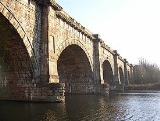
Lune Aqueduct
Encyclopedia
The Lune Aqueduct is a navigable aqueduct
that carries the Lancaster Canal
over the River Lune
, on the east side of the city of Lancaster
in Lancashire
, England. It is was completed in 1797 at a total cost of £48,320.18s.10d.
It is a Grade I listed building.
powder was imported to be mixed with cement, which allowed the concrete to set under water.
Because of the rush to finish the initial stages, before the winter floods, the construction was carried out around the clock and the final bill for the project was over £30,000 over budget (2.6 times the original estimate). This vast overspend was the reason that the Lancaster canal was never joined to the main canal network – there wasn’t enough money for the planned aqueduct over the River Ribble
at the southern end of the canal.
plans to spend £3m on re-lining and repairing the Grade I listed structure.
This upgrade will also make the structure more accessible for visitors, including new signs, notice boards and car parking.
Aqueduct
An aqueduct is a water supply or navigable channel constructed to convey water. In modern engineering, the term is used for any system of pipes, ditches, canals, tunnels, and other structures used for this purpose....
that carries the Lancaster Canal
Lancaster Canal
The Lancaster Canal is a canal in the north of England, originally planned to run from Westhoughton in Lancashire to Kendal in south Cumbria...
over the River Lune
River Lune
The River Lune is a river in Cumbria and Lancashire, England.It is formed at Wath, in the parish of Ravenstonedale, Cumbria, at the confluence of Sandwath Beck and Weasdale Beck...
, on the east side of the city of Lancaster
Lancaster, Lancashire
Lancaster is the county town of Lancashire, England. It is situated on the River Lune and has a population of 45,952. Lancaster is a constituent settlement of the wider City of Lancaster, local government district which has a population of 133,914 and encompasses several outlying towns, including...
in Lancashire
Lancashire
Lancashire is a non-metropolitan county of historic origin in the North West of England. It takes its name from the city of Lancaster, and is sometimes known as the County of Lancaster. Although Lancaster is still considered to be the county town, Lancashire County Council is based in Preston...
, England. It is was completed in 1797 at a total cost of £48,320.18s.10d.
It is a Grade I listed building.
Construction
The aqueduct is a traditional structure of that time, consisting of five brick arches supporting the stone trough. Within the piers, special volcanic pozzolanaPozzolana
Pozzolana, also known as pozzolanic ash , is a fine, sandy volcanic ash. Pozzolanic ash was first discovered and dug in Italy, at Pozzuoli. It was later discovered at a number of other sites as well...
powder was imported to be mixed with cement, which allowed the concrete to set under water.
Because of the rush to finish the initial stages, before the winter floods, the construction was carried out around the clock and the final bill for the project was over £30,000 over budget (2.6 times the original estimate). This vast overspend was the reason that the Lancaster canal was never joined to the main canal network – there wasn’t enough money for the planned aqueduct over the River Ribble
River Ribble
The River Ribble is a river that runs through North Yorkshire and Lancashire, in northern England. The river's drainage basin also includes parts of Greater Manchester around Wigan.-Geography:...
at the southern end of the canal.
Future Upgrade
British WaterwaysBritish Waterways
British Waterways is a statutory corporation wholly owned by the government of the United Kingdom, serving as the navigation authority in England, Scotland and Wales for the vast majority of the canals as well as a number of rivers and docks...
plans to spend £3m on re-lining and repairing the Grade I listed structure.
This upgrade will also make the structure more accessible for visitors, including new signs, notice boards and car parking.
Inscriptions
The structure bears two inscriptions:- North side: "To Public Prosperity"
- South side: "Things that are wanting are brought together / Things remote are connected / Rivers themselves meet by the assistance of art / To afford new objects of commerce" (translated from the LatinLatinLatin is an Italic language originally spoken in Latium and Ancient Rome. It, along with most European languages, is a descendant of the ancient Proto-Indo-European language. Although it is considered a dead language, a number of scholars and members of the Christian clergy speak it fluently, and...
)
See also
- Canals of the United KingdomCanals of the United KingdomThe canals of the United Kingdom are a major part of the network of inland waterways in the United Kingdom. They have a colourful history, from use for irrigation and transport, through becoming the focus of the Industrial Revolution, to today's role for recreational boating...
- List of canal aqueducts in the United Kingdom

